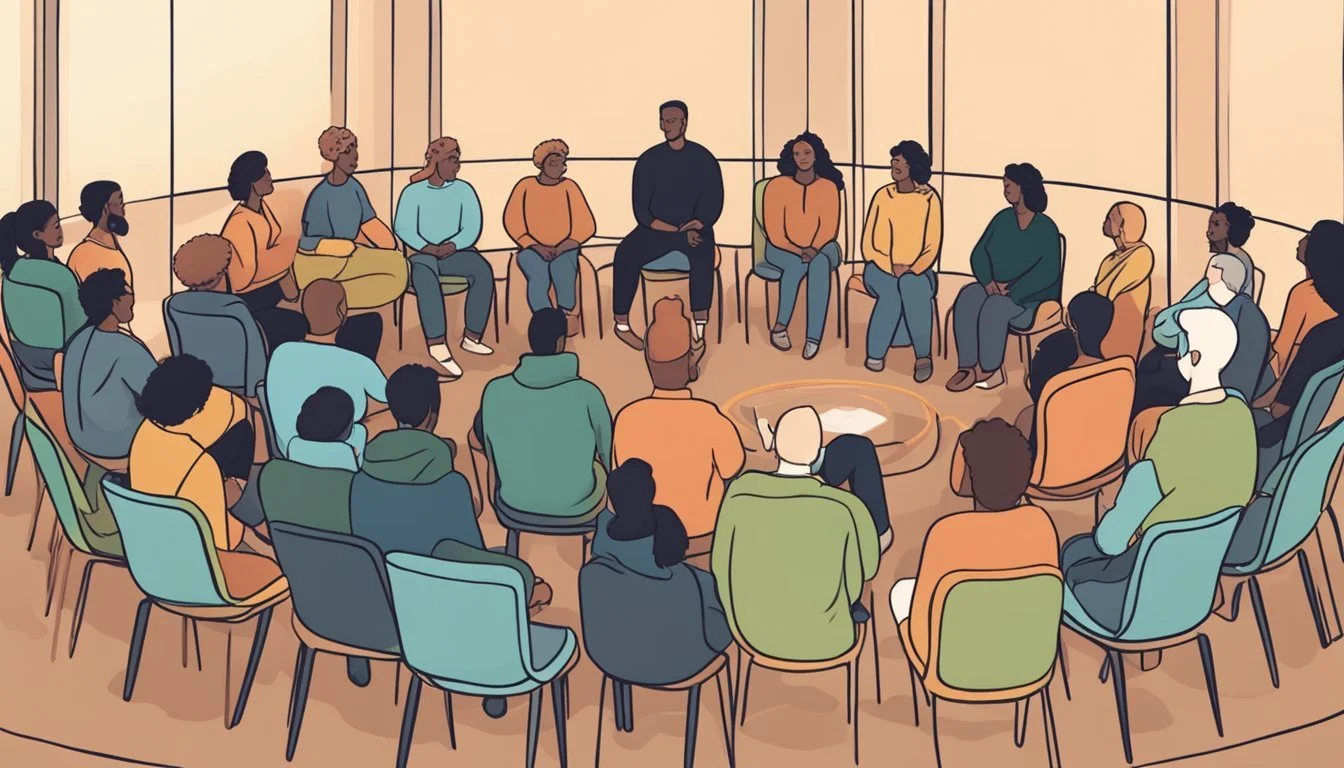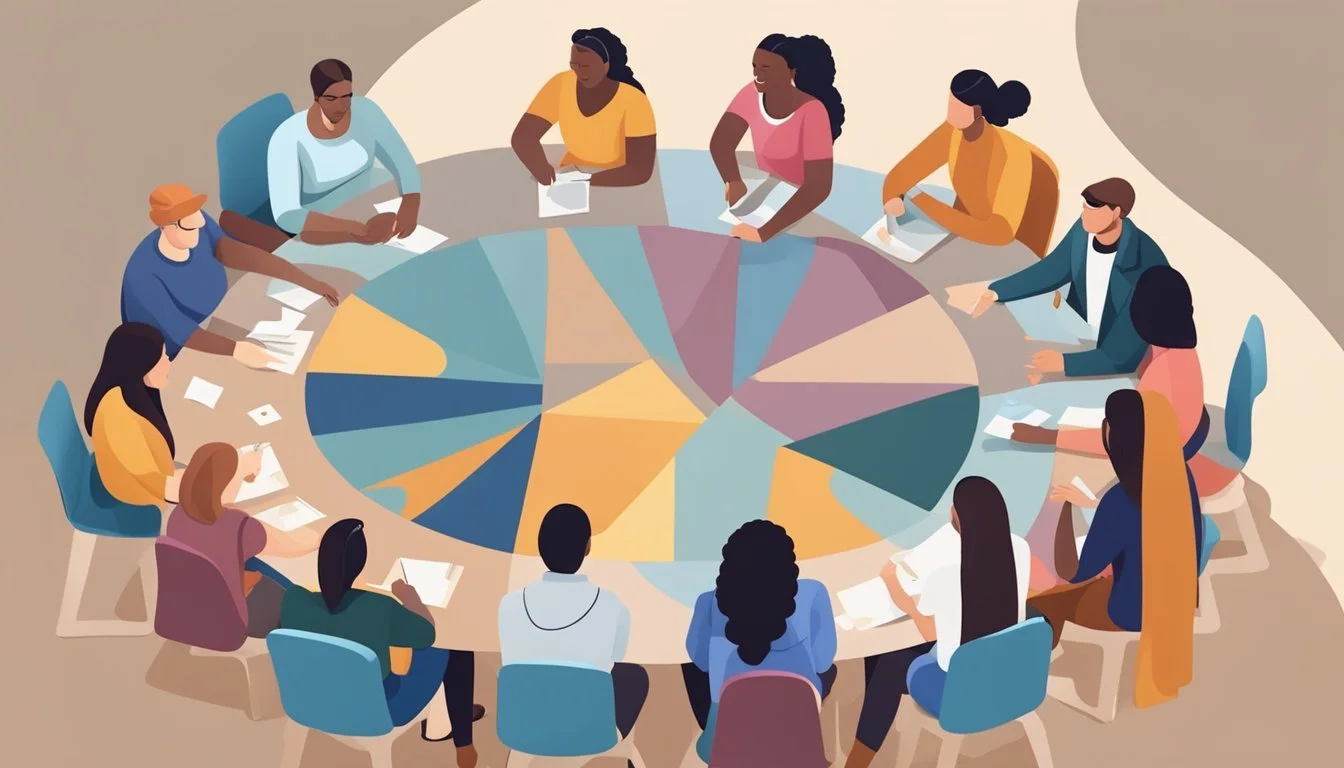Find Healing: Discover a Narcissist Recovery Group Near Me
Seeking support after experiencing narcissistic abuse can be a crucial step in the healing process. Many survivors find solace and understanding in narcissist recovery groups, which provide a safe space to share experiences and learn coping strategies. These groups are available in various locations, and finding one nearby can be as simple as searching online or contacting local mental health organizations.
Narcissist recovery groups offer a unique opportunity to connect with others who have faced similar challenges. Participants often report feeling validated and less isolated as they hear stories that resonate with their own experiences. These groups may be led by trained professionals or fellow survivors, and can take place in-person or online, making them accessible to a wide range of individuals.
Joining a local narcissist recovery group can provide ongoing support throughout the healing journey. Regular meetings allow survivors to track their progress, gain new insights, and develop a network of supportive peers. Many groups also offer resources and information about narcissistic abuse, empowering members to better understand their experiences and move forward with confidence.
Understanding Narcissism
Narcissism is a complex personality trait characterized by an inflated sense of self-importance and a deep need for excessive attention and admiration. It exists on a spectrum, ranging from healthy self-confidence to pathological narcissistic personality disorder.
Defining Narcissistic Personality Disorder
Narcissistic Personality Disorder (NPD) is a mental health condition defined by a pervasive pattern of grandiosity, need for admiration, and lack of empathy. Individuals with NPD often display a distorted self-image and struggle with maintaining healthy relationships.
Key diagnostic criteria for NPD include:
Grandiose sense of self-importance
Preoccupation with fantasies of unlimited success, power, or beauty
Belief in one's own uniqueness and superiority
Need for constant admiration
Sense of entitlement
Interpersonal exploitation
Lack of empathy
Envy of others or belief that others are envious of them
Arrogant behaviors or attitudes
Common Narcissistic Traits and Behaviors
Narcissistic individuals often exhibit distinctive traits and behaviors that can be challenging for those around them. These may include:
Excessive self-promotion and boasting
Difficulty accepting criticism or feedback
Manipulation of others for personal gain
Inability to recognize or respect others' boundaries
Constant need for attention and validation
Lack of accountability for their actions
Tendency to belittle or demean others
Difficulty maintaining long-term relationships
Narcissists may also display a sense of entitlement, expecting special treatment without reciprocating. Their lack of empathy often leads to disregard for others' feelings and needs, causing emotional harm to those close to them.
Recognizing Narcissistic Abuse
Narcissistic abuse can take many forms and have profound effects on victims. Identifying manipulative tactics and recognizing the signs of abuse are crucial steps in the recovery process.
Forms of Narcissistic Manipulation
Gaslighting is a common manipulation tactic used by narcissists. It involves making victims question their own reality and memories. Love bombing is another technique where the narcissist showers the victim with affection and gifts early in the relationship.
Narcissists often use silent treatment as punishment. They may withhold affection or communication to control their partners. Triangulation involves bringing a third party into the relationship to create jealousy or insecurity.
Projection is when narcissists accuse others of their own faults or behaviors. This deflects attention from their own shortcomings. Financial abuse can occur when narcissists control or exploit their partner's finances.
Signs of Narcissistic Abuse
Constant criticism and belittling comments are hallmarks of narcissistic abuse. Victims often feel they can never meet their partner's unrealistic expectations. Narcissists frequently display a lack of empathy for others' feelings.
Boundary violations are common. Narcissists may ignore personal space or privacy. They often exhibit controlling behaviors, dictating who their partner can see or what they can do.
Emotional volatility is another red flag. Narcissists may have unpredictable mood swings or explosive anger. They rarely take responsibility for their actions and often blame others for problems.
Effects on Mental Health
Narcissistic abuse can lead to severe psychological distress. Victims often experience depression, feeling hopeless and worthless. Anxiety disorders are common, with individuals constantly on edge.
Post-traumatic stress disorder (PTSD) can develop from prolonged exposure to narcissistic abuse. Flashbacks, nightmares, and hypervigilance are typical symptoms.
Low self-esteem is a frequent outcome. Victims may struggle with self-doubt and feelings of inadequacy. Chronic stress from abuse can lead to physical health problems like insomnia and digestive issues.
Trust issues often persist long after the abusive relationship ends. Many survivors find it difficult to form new relationships or open up to others.
The Impact of Narcissistic Relationships
Narcissistic relationships can have profound and lasting effects on those involved. The damage often extends beyond the immediate relationship to impact other areas of a person's life.
Dynamics in Toxic Relationships
Narcissistic relationships are characterized by a pattern of manipulation and control. The narcissist often employs tactics like gaslighting, emotional blackmail, and love bombing to maintain power over their partner.
These relationships typically lack genuine emotional intimacy. The narcissist's need for admiration and inability to empathize create an imbalanced dynamic where the partner's needs are consistently neglected.
Over time, victims may develop codependency, constantly trying to please the narcissist at the expense of their own well-being. This can lead to a loss of self-identity and autonomy.
Challenges Faced by Survivors
Survivors of narcissistic relationships often struggle with trust issues. The repeated betrayals and manipulation make it difficult to form healthy connections in future relationships.
Many experience symptoms of trauma, including anxiety, depression, and hypervigilance. These can persist long after the relationship has ended, affecting daily functioning and quality of life.
Rebuilding self-esteem is a significant challenge. Years of criticism and devaluation can leave survivors doubting their worth and capabilities.
Family dynamics may be strained, especially if the narcissist isolated the survivor from their support network. Repairing these relationships takes time and effort.
Financial recovery can also be a hurdle, particularly if the narcissist engaged in economic abuse or left the survivor with debt.
Narcissist Recovery Journey
Survivors of narcissistic abuse embark on a transformative path to reclaim their lives and rebuild their sense of self. This journey involves healing emotional wounds, restoring self-confidence, and developing resilience.
Healing from Emotional Scars
Recognizing and acknowledging the impact of narcissistic abuse is the first step in healing. Survivors often experience feelings of confusion, self-doubt, and anxiety. Professional therapy can provide a safe space to process these emotions and gain clarity.
Trauma-informed therapists help survivors understand the dynamics of narcissistic relationships. They guide clients through techniques like cognitive-behavioral therapy and EMDR to address past traumas.
Support groups offer valuable peer connections. Sharing experiences with others who have faced similar challenges can be validating and empowering. Many survivors find comfort in knowing they're not alone.
Building Confidence and Self-Worth
Narcissistic abuse often erodes self-esteem. Rebuilding confidence is crucial for recovery. This process involves challenging negative self-talk and reframing harmful beliefs instilled by the abuser.
Positive affirmations and self-care practices play a key role in restoring self-worth. Survivors learn to prioritize their needs and set healthy boundaries.
Accomplishing small goals helps rebuild trust in one's abilities. This might include pursuing hobbies, learning new skills, or advancing in career goals.
Developing Healthy Coping Mechanisms
Survivors learn to replace maladaptive coping strategies with healthier alternatives. Mindfulness and meditation techniques can help manage anxiety and intrusive thoughts.
Journaling provides an outlet for processing emotions and tracking progress. It also serves as a tool for identifying triggers and patterns.
Physical activities like yoga or exercise release endorphins and promote overall well-being. Creative pursuits such as art or music offer therapeutic benefits and self-expression.
Building a support network of trusted friends and family is essential. These relationships provide emotional support and help reinforce healthy relationship dynamics.
Support for Narcissism Survivors
Support groups and professional guidance play crucial roles in helping survivors of narcissistic abuse heal and recover. These resources provide validation, understanding, and practical tools for navigating the aftermath of toxic relationships.
The Role of Support Groups
Support groups offer a safe space for survivors to share experiences and gain insights from others who have faced similar challenges. These groups foster emotional healing through peer support and validation. Participants can learn coping strategies, set healthy boundaries, and rebuild self-esteem.
Support groups often address common issues like:
Recognizing abuse patterns
Dealing with trauma bonding
Overcoming guilt and shame
Rebuilding identity and self-worth
Many survivors find comfort in knowing they're not alone in their struggles. Hearing others' stories can help normalize experiences and reduce feelings of isolation.
Finding Local and Online Groups
Local support groups provide face-to-face interaction and community connection. To find nearby groups:
Check community centers or mental health clinics
Search online directories for narcissistic abuse support
Ask therapists for recommendations
Online support groups offer convenience and anonymity. Options include:
Facebook groups for narcissistic abuse survivors
Forums on recovery websites
Virtual meetups through platforms like Zoom
The National Domestic Violence Hotline can also provide referrals to local resources and support groups.
Professional Guidance and Therapy
While support groups are valuable, professional therapy is often essential for deep healing. Therapists specializing in narcissistic abuse can offer:
Trauma-informed treatment approaches
Tools for managing anxiety and depression
Strategies for setting boundaries
Guidance on rebuilding healthy relationships
Types of therapy that may be helpful include:
Cognitive Behavioral Therapy (CBT)
Eye Movement Desensitization and Reprocessing (EMDR)
Dialectical Behavior Therapy (DBT)
Some therapists offer group sessions, combining professional guidance with peer support. This format can be particularly effective for addressing narcissistic abuse recovery.
Creating a Safe Environment for Healing
Support groups for narcissistic abuse survivors prioritize creating a secure space for healing and recovery. Establishing clear boundaries, fostering empathy, and ensuring confidentiality are essential components of a safe environment.
Establishing Boundaries
Setting clear boundaries helps protect participants and create a sense of security. Groups often establish ground rules at the start, such as:
Respecting confidentiality
No interrupting or talking over others
Refraining from giving unsolicited advice
Avoiding judgmental language or criticism
These guidelines create structure and predictability, allowing members to feel more at ease sharing their experiences. Group facilitators play a key role in enforcing boundaries and addressing any violations promptly and respectfully.
Fostering Empathy and Mutual Respect
Cultivating empathy and mutual respect is crucial for a supportive atmosphere. Group leaders encourage active listening and validate members' feelings and experiences. This approach helps participants feel heard and understood.
Exercises that promote empathy include:
Sharing personal stories
Practicing reflective listening
Discussing common experiences of narcissistic abuse
By fostering a culture of empathy, groups create an environment where survivors can connect and support each other through their healing journeys.
Ensuring a Safe Space for Sharing
Creating a physically and emotionally safe space is paramount for narcissistic abuse support groups. Many groups partner with domestic violence centers or community organizations to provide secure meeting locations.
Emotional safety measures include:
Screening potential members to ensure group fit
Offering options for anonymity or using first names only
Providing crisis resources and referrals
Group facilitators receive training in trauma-informed care and recognize signs of distress. They're prepared to intervene if discussions become too intense or triggering for participants.
Resources for Recovering from Narcissistic Abuse
Recovering from narcissistic abuse requires access to reliable information and effective strategies. Survivors can benefit from educational materials, self-help techniques, and professional support to heal and reclaim their lives.
Educational Materials and Books
Books on narcissistic abuse provide valuable insights into toxic relationships and healing processes. "Psychopath Free" by Jackson MacKenzie offers guidance on recognizing manipulation tactics. "The Narcissist's Playbook" by Dana Morningstar exposes common control strategies used by abusers.
Online resources like PsychCentral and Healthline offer articles on narcissistic personality disorder and its impact on victims. These materials help survivors understand the dynamics of their experiences and validate their emotions.
Podcasts such as "Narcissist Apocalypse" and "Narcissist Abuse Support" feature expert interviews and survivor stories. They provide ongoing education and encouragement for those in recovery.
Self-Help and Empowerment Strategies
Journaling is a powerful tool for processing emotions and tracking progress in recovery. Writing exercises can help rebuild self-esteem and challenge negative thought patterns instilled by abusers.
Mindfulness practices like meditation and deep breathing exercises reduce anxiety and promote emotional regulation. These techniques help survivors stay grounded when dealing with trauma triggers.
Support groups, both online and in-person, offer safe spaces to share experiences and learn from others. Websites like Meetup.com list local narcissistic abuse recovery groups. Online forums provide 24/7 peer support for those unable to attend in-person meetings.
Self-care routines, including regular exercise, healthy eating, and adequate sleep, are crucial for physical and emotional healing. Engaging in hobbies and creative pursuits helps survivors rediscover their identities and passions.





